Norfolk Law
NCLS Pub Quiz
Law Society members supported this fun night out raising money to increase access to justice

Presidential Election
Following the AGM we welcome our new President Ginny Colman & VP Shelyna
Mariscal to lead the next NNLS year
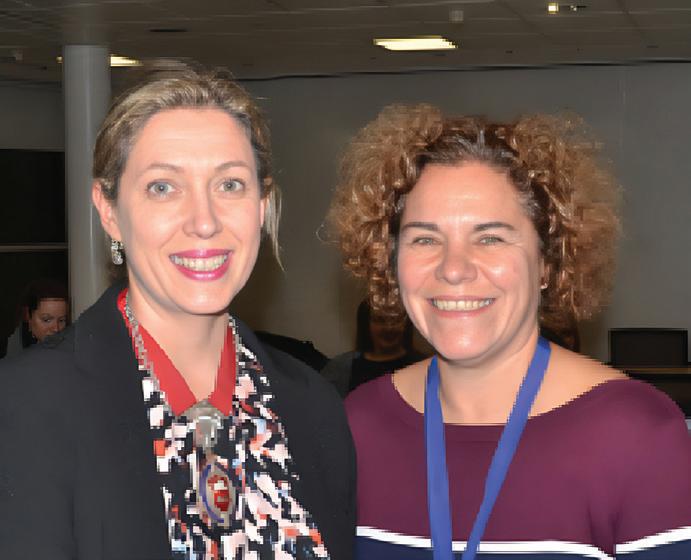
Magazine of the Norfolk & Norwich Law Society - www.nnls.org - Spring 2023
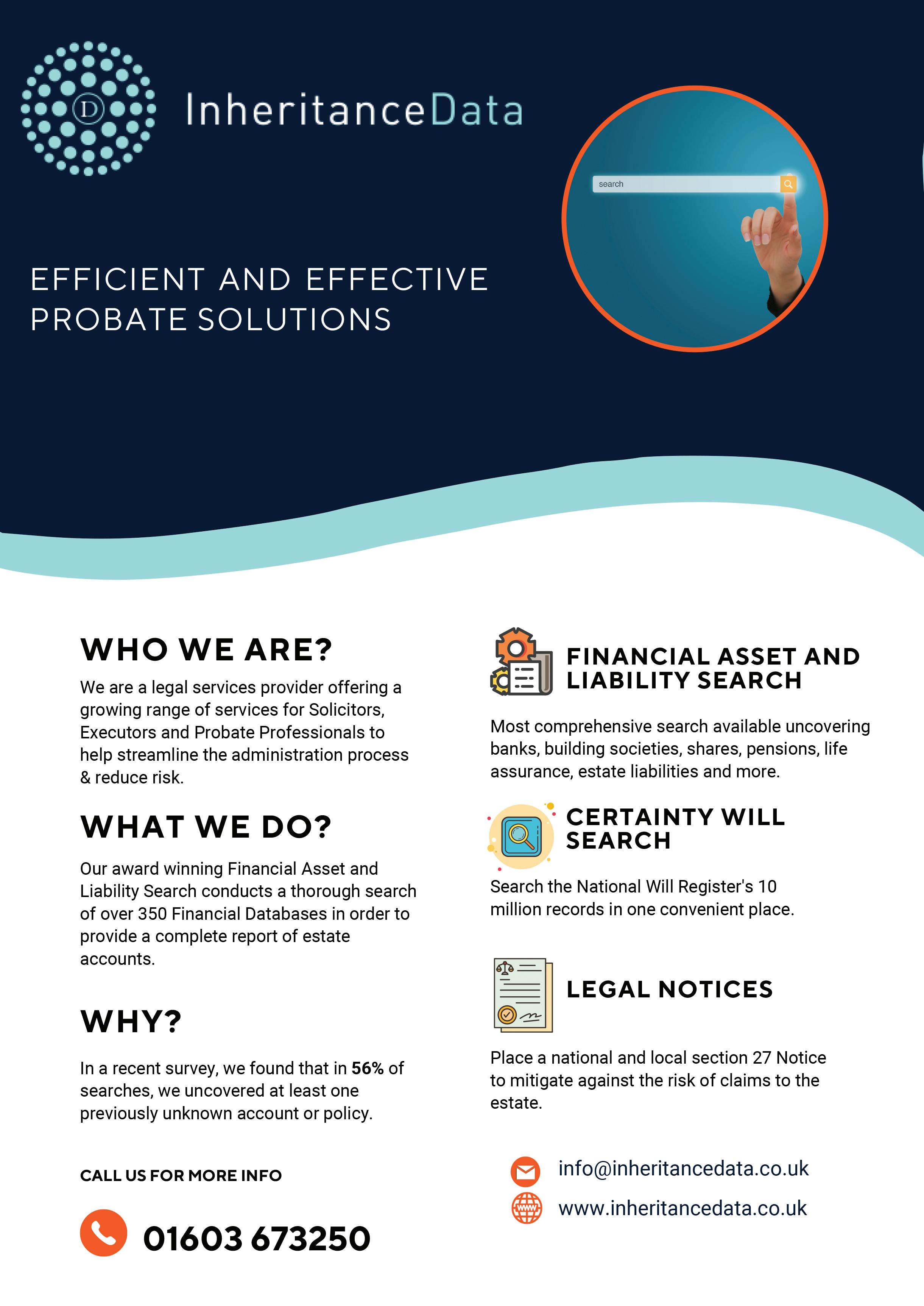


www.nnls.org Norfolk Law - Contents - 3 Welcome to our first edition of 2023, lots to catch up on, the Law Lecture with the UEA at the tail end of last year, the NCLS Pub Quiz, plus details of our forthcoming CPD events and dates for the Legal Walk. Countdown has happened, but missed the cut, so look out for our next edition to see if you made the spread! This issue... Contents Published by: EAST PARK COMMUNICATIONS Ltd. Unit 27a, Price St. Business Centre, Price St., Birkenhead, Wirral, Merseyside CH41 4JQ Tel: 0151 651 2776 simon@eastparkcommunications.co.uk www.eastparkcommunications.co.uk Advertising Simon Castell Managing Editor Sue Bailey Layout Stuart Turner pp. 1-18 David Coffey pp. 19-36 Accounts Tony Kay Published Spring 2023 © East Park Communications Ltd. Legal Notice © East Park Communications Ltd. None of the editorial or photographs may be reproduced without prior written permission from the publishers. East Park Communications Ltd would like to point out that all editorial comment and articles are the responsibility of the originators and may or may not reflect the opinions of East Park Communications Ltd. Correct at time of going to press. 4 President’s Report 5 Committee 6 Events for Spring 7 New Countdown Sponsors 8 NCLS Pub Quiz 10 Index PI 12 Society News 14 Cock-Up Corner 16 UAE / NNLS Law Lecture 2023 18 Interview - Sarah Softley 20 Rise in Charity Bequests 25 Legacies and the Cost-Of-Living Crisis 26 Able Community 27 The Illegal Migration Bill 28 Book Review 30 Business Relationships in the Age of Technology 32 Young Adults and Consent to DNA Tests 34 Legal Firms and Mental Health
President’s Report
Firstly, I would like to say a huge thank you to Jessica Piper, our outgoing president, who with support of the committee and members saw through 2022 in great style and passion. I think 2023 will be a very special year for her in other ways, but I hope Jessica looks back and basks in the glory of the excellent job she did.
A few of our committee members have changed their roles. I do need to extend my gratitude to Zak Virgin who has worked tirelessly as our Treasurer for so many years. Itís a role thatís essential but gets little recognition. He financially steered us through some interesting years what with dreaded Covid! On behalf of all members, Zak “Gratias tibi” for keeping us in funds!
Sadly, Richard Barr has stepped down as our national representative and we owe him thanks for the years he served the society. Finally, thank you, to all of class “committee” 2022 for all of your hard work and effort.
It’s class of 2023’s turn. As I write, the Countdown for Lawyers, sponsored by Smith & Pinching, is nearly upon us. Mark Fitch is primed, toned and ready again... 10 years’ worth of support, that deserves more thanks.
Save the dates: The legal walk, 11 May is already taking shape. A summer June party, details to follow soon. The Annual dinner is booked 19 October 2023. Lady Hale hosts our UEA/ NNLS combined Law lecture on 9 November. Carla Morphett has our training schedule all under control. Any law firms wishing to help sponsor please contact me.
Please don’t forget if you do want to join the committee we are welcoming and please approach Claire Clarke admin@nnls. org, there is always room for enthusiasm.

So 2023, let’s get started then, no time to waste!
Ginny Colman President, Norfolk & Norwich Law Society 2023-24

4 - Norfolk Law - President’s Report
www.nnls.org

Norfolk Law - Committee - 5
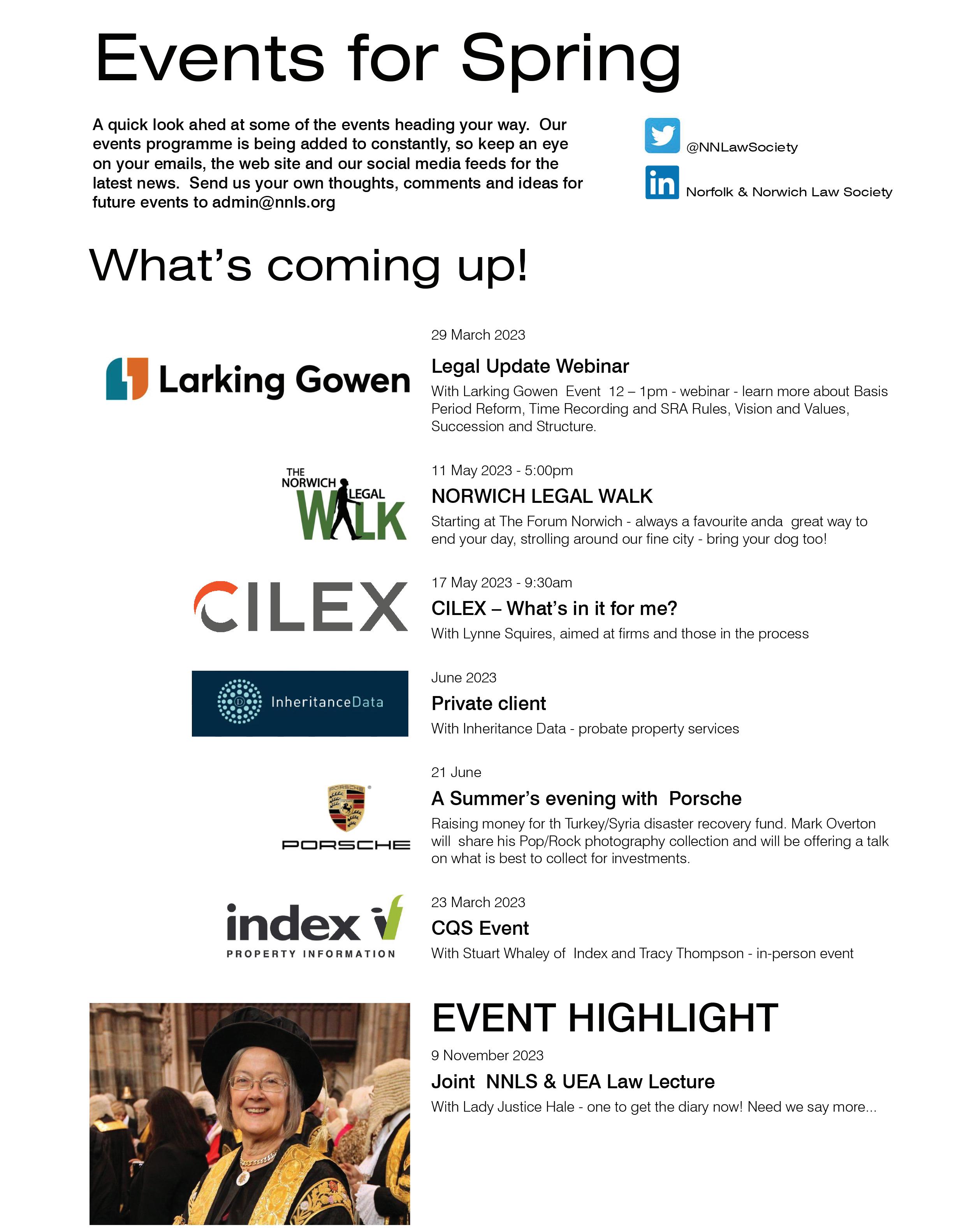
www.nnls.org 6 - Norfolk Law - Events

www.nnls.org Norfolk Law - Events - 7
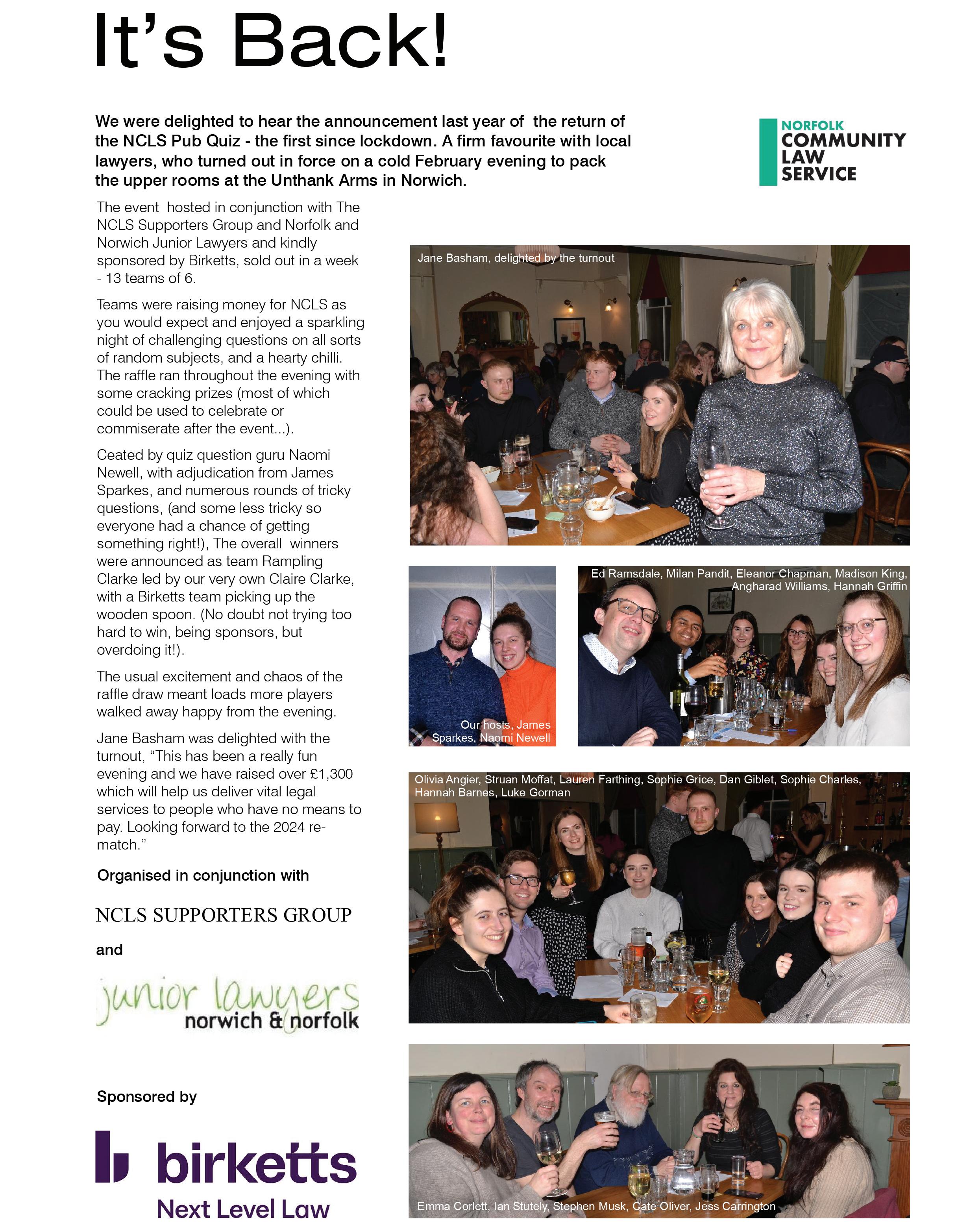
www.nnls.org 8 - Norfolk Law - NCLS Pub Quiz

www.nnls.org Norfolk Law - NCLS Pub Quiz - 9


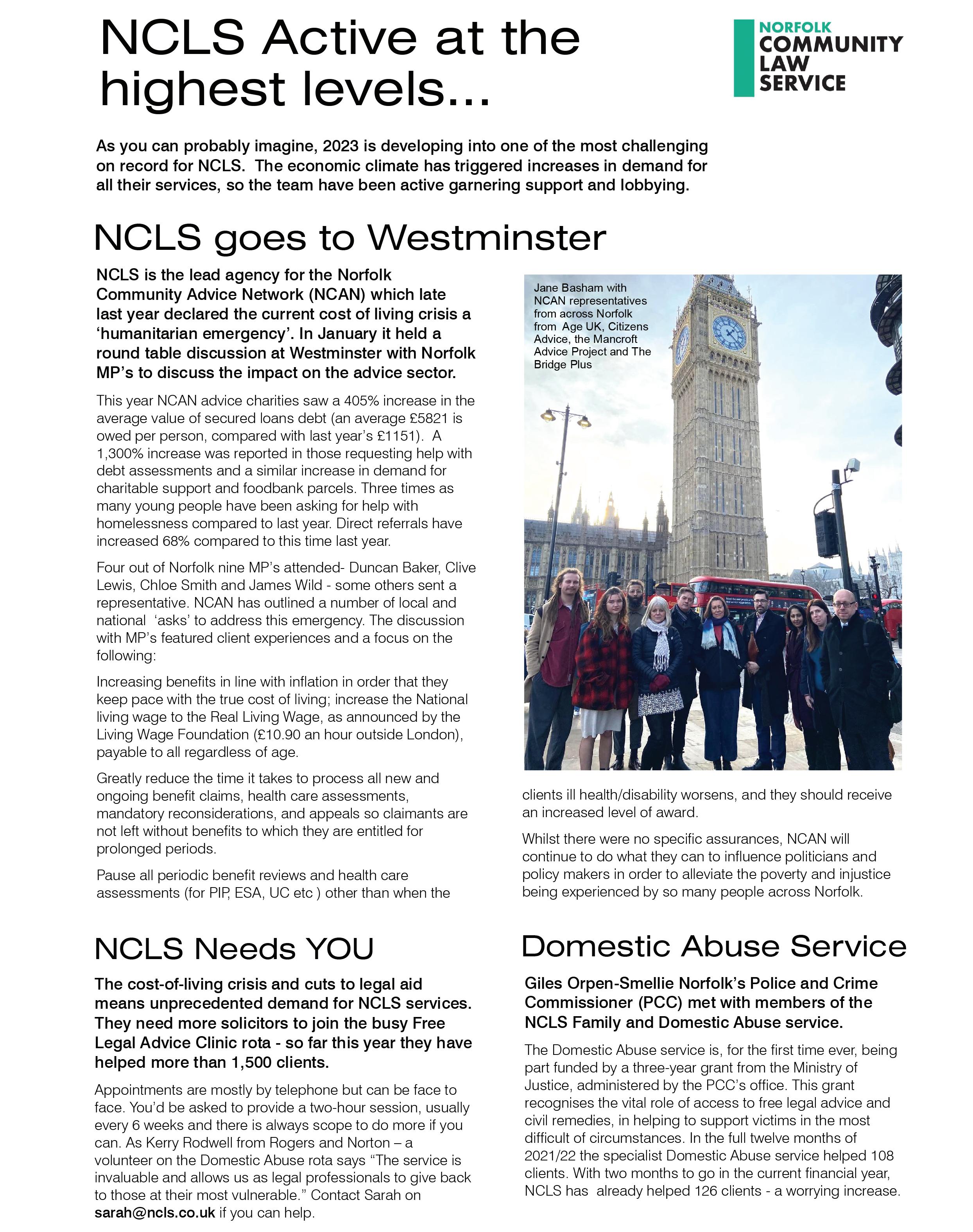
www.nnls.org 12 - Norfolk Law - NCLS News


www.nnls.org 14 - Norfolk Law - Richard Barr Column
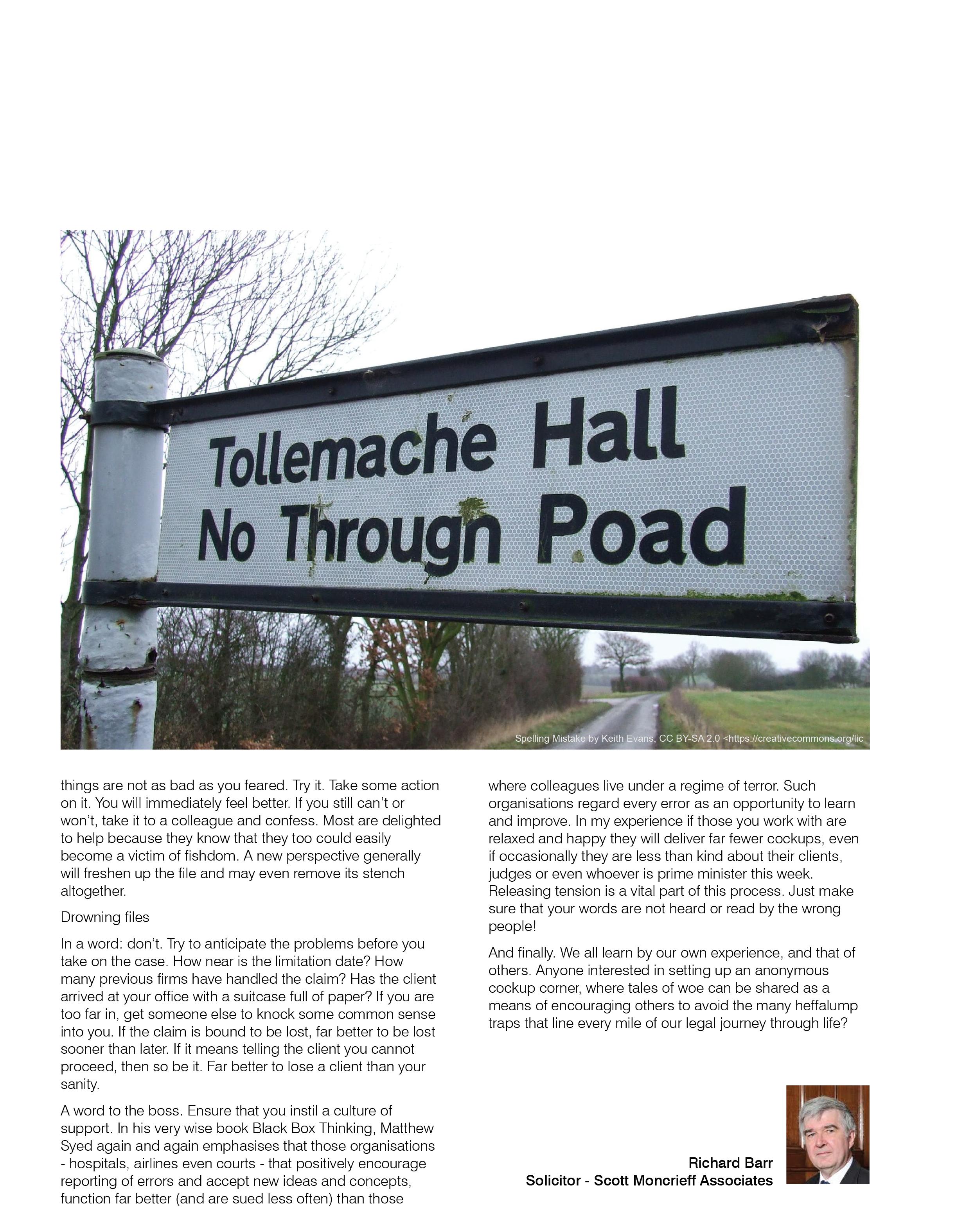
www.nnls.org Norfolk Law - Richard Barr Column - 15

www.nnls.org 16 - Norfolk Law - Law Lecture

www.nnls.org Norfolk Law - Law Lecture - 17

www.nnls.org 18 - Norfolk Law - Interview

Charities received the highest number of bequests in 2022
Poppy’s
When Poppy’s Dog Guardian conta
New figures released today show that 2022 was another strong year for charitable gifts in wills in England & Wales.
In 2022, Smee & Ford identified 36,992 charitable estates out of a total of 231,582 estates processed that included a will; meaning that one in six wills processed included a gift to charity.
The total value of charitable estates exceeded the prediction of £20bn in Smee and Ford’s September update, finishing on £21.3bn. And the number of individual bequests within charitable estates granted probate in 2022 was also the highest number they have ever recorded, finishing on 123,298.*
“It is encouraging to see that 2022 was another strong year for legacy income and that the number of charitable bequests recorded in wills has reached a
new record.”
- Polly Avgherinos, Managing Director at Smee & Ford
The value of legacies continued to be significant for charities in 2022, with 31% of legacy income coming from bequests worth over £500k. A further 22% came from bequests valued between £100£250k, meaning over half of all legacy income in 2022 came from high value bequests worth over £100k.
At the time of writing, not all organisations have yet reported their final accounts to the Charity Commission, so the final legacy income figure for 2022 is not yet confirmed, but as a conservative estimate Smee & Ford predict it may sit at around £3.5bn.
“In today’s volatile economic environment, it’s hugely encouraging
that gifts in Wills continue to be such a significant and vital source of income for UK charities. More and more fundraisers tell us that legacy income is what’s enabling them to continue delivering services and, perhaps what’s most exciting, we’re seeing growing recognition among senior management of the importance of shoring up legacy fundraising teams and investment to protect their charities’ futures.”
 - Allan Freeman, Chair of Remember A Charity
- Allan Freeman, Chair of Remember A Charity


The full and final statistics will be shared in Smee & Ford’s annual Legacy Trends report, released later this year. You can register at https://smeeandford.com/ legacy-trends-2023-register-interest/ to request a copy as soon as it is available.
*Please note, these statistics relate to England and Wales only.
Canine www.nnls.org
20 - Norfolk Law - Advertorial
20 - Norfolk Law - Charity




www.nnls.org 22 - Norfolk Law - Advertorial
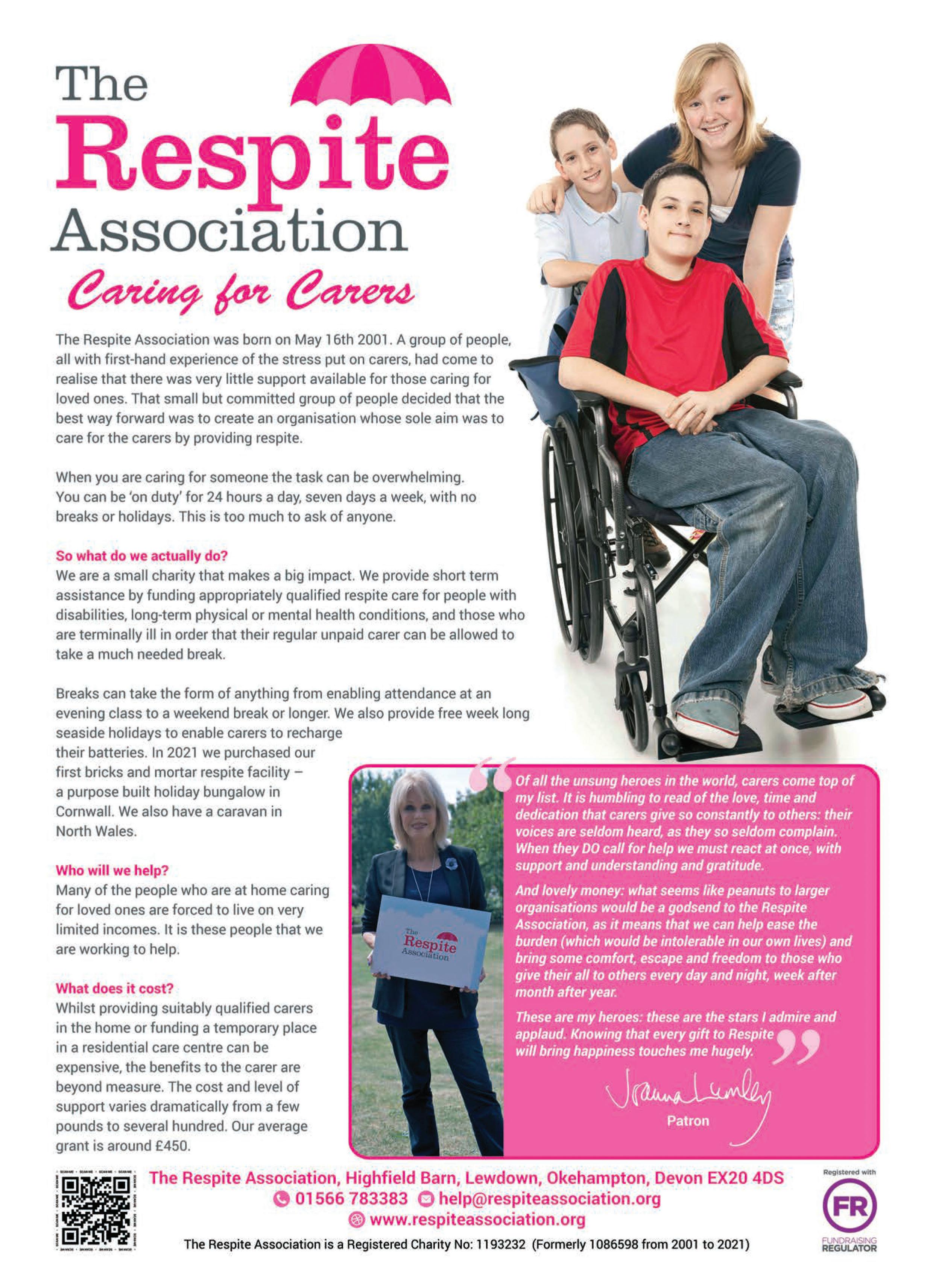
www.nnls.org

How will the cost-of-living impact gifts in Wills?
Today, almost six in ten (59%)1 people in the UK feel their finances are worsening, one in four households are struggling to pay the bills2 and, inevitably, this means that many people are having to hold off from donating to good causes 3
The irony of this is of course that, as people struggle to heat their homes, pay the rent and put food on the table, demand for charitable services becomes all the more urgent. We’re now at the point where 9 out of 10 food banks fear they won’t be able to meet the public’s needs4 and reduced funding means services may well face cuts or even closures, whether that means fewer people to field calls to mental health support lines, cutbacks on sports facilities or community outreach services and all manner of charitable services.
In this environment, income from charitable legacies is vital, strengthening charities’ resilience for the years to come. Gifts in Wills now raise £3.5 billion for good causes annually and, for many, that income has become the defining factor as to whether organisations can keep their doors open, whether they can pivot to deliver services in new ways and – in some cases – even to enhance their support for those in need.

What’s more, in a challenging economic world, gifts in Wills – which won’t leave a donor’s bank account until after the donor has passed on – can be not only a deeply symbolic and meaningful decision, but an attractive and practical offering. And this is where legal professionals are playing an increasingly important role.
Role of solicitors and Will writers
Our tracking study indicates that one in five Wills handled by UK legal advisers (22%) now include a donation to charity.5 The public is twice as likely to make a gift when a professional adviser references the charitable option. And solicitors and Will-writers alike are seeing growing demand for end-of-life planning that reflects people’s deep connections with good causes.
While charitable Wills were once perceived to be the domain of those who are child-free, there is far greater awareness now that people of all backgrounds – those with family and without – often feel a strong desire to leave the world a better place. Gifts in Wills can be a fantastic way of shaping the world they leave behind for future generations. And when it comes with such a generous tax benefit, this is a welcome bonus.
Again, donors often hear about the potential tax break on legacy gifts from legal advisers explaining that such donations are exempt from Inheritance Tax, and that, if they choose to give 10% or more, the remaining IHT bill is reduced further still - charged at 36% rather than 40%. Supporters are unlikely to make fiscal savings that exceed the cost of their donation, but for those who wish to support good causes, that reduction can be a strong incentive. Although there are multiple avenues for will-writing, the impartiality and ability of solicitors to offer experienced and tailored advice to clients is all the more valued when it comes to making informed decisions about people’s inheritance and how good causes can benefit.
Free campaign supporter scheme for legal advisers
Through our Campaign Supporter scheme, which includes some 800 Will writers and solicitors who commit to making relevant clients aware of the option of leaving a charitable gift in their Will, we see growing demand for legacy giving. And the impact of that shift is considerable. If each of those advisers were to have even just one conversation next year leading to a gift in a Will, this would likely raise around £4 million for good causes. And when those conversations are happening daily, imagine what a difference this could make.
Remember A Charity runs a free Campaign Supporter scheme for solicitors and Will-writers, providing promotional resources and guidance for referencing legacy giving with clients.
Find out more at www.rememberacharity.org.uk/solicitor

www.nnls.org Norfolk Law - Charity - 25
Poppy’s
When Poppy’s Dog Guardian conta

Canine www.nnls.org
26 - Norfolk Law - Advertorial
Parliamentary briefing: the Illegal Migration Bill
Specifically, it aims to deal with migrants who have entered the UK via irregular means by:

• removing them back to their home country or a ‘safe’ third country such as Rwanda
• block them from accessing modern slavery protections
puts the UK at increased legal liability. The Bill contains limited safeguards that, coupled with restrictive timescales for appeal, are likely to diminish access to justice for everyone caught by its provisions. It is unclear where those in detention will be held and how they will access legal advice.
We’ve prepared a briefing on the Illegal Migration Bill, which includes our concerns about the Bill’s compatibility with our international obligations, how it affects the rule of law and our access to justice.
We’ve prepared a briefing which outlines our view on the Illegal Migration Bill ahead of its second reading in parliament.
The bill focuses on a number of challenges with the UK asylum system.
• only hearing human rights claims after removal
Our view
We are concerned that the Bill may be incompatible with our international obligations under the European Court of Human Rights. Breaching our international obligations undermines the rule of law.
The Bill will fundamentally reduce the oversight of our courts. More cases are likely to end up in Strasbourg, which
Tens of thousands of people could be detained indefinitely, at extensive cost to the UK taxpayer, as no ‘safe’ third country (beyond Rwanda) is available. It is not clear that this bill is workable on its own terms.
This could all have significant implications for our reputation as a reliable nation that upholds its international responsibilities, which has long underpinned our position as an attractive hub for global investment and as a bastion of the rule of law.

www.nnls.org Norfolk Law - Advertorial - 27
Book Review
REDFERN AND HUNTER ON INTERNATIONAL ARBITRATION
7th edition
By Nigel Blackaby KC, Constantine Partasides KC, with Alan Redfern
ISBN 978 0 19286 990 6
OXFORD UNIVERSITY PRESS
www.oup.co.uk
A WELCOME NEW EDITION ON THE LAW AND PRACTICE OF INTERNATIONAL ARBITRATION FOR 2023
There is also a pack edition available which offers gives the practitioner a copy of this hardback edition. There is also an access code available for the digital edition, which can be accessed via the “LawReader” app for the more technical-savvy modern lawyers.
What we now get is a leading international authority on the law and practice of international arbitration written by lawyers highly experienced in conducting international arbitration, both as counsel and as international arbitrators. They have included useful appendices on the major international rules of arbitration and conventions and model arbitration clauses for international contracts which will be useful to all readers.
We welcome the new edition of “Redfern and Hunter on International Arbitration” now in a seventh edition from Oxford University Press. Sadly, Professor Martin Hunter passed away in 2021, but Alan Redfern continues to assist in the revision of the text which is now undertaken by Nigel Blackaby KC and Constantine Partasides KC.

This book has established itself as the leading treatise on the law and practice of international arbitration, described as “the pre-eminent method for the peaceful resolution of disputes in international trade, investment, and commerce.”
Do read the moving Foreword written by Alan Redfern which gives some history to the publication and the distinguished colleagues who have been a part of its germination over the decades. Today, the title gives us an excellent introduction to the subject in just over 700 pages. It explores the chronology of an arbitration from the drafting of the arbitration agreement right through to the enforcement of the arbitral award which we believe will be fascinating both to the student and the more experienced practitioner.
Written by the experienced author team of Blackaby and Partasides with extensive experience as counsel and arbitrators, the seventh edition has been read and cited by international lawyers, arbitrators, and judges. It is right to say that it has become “a key learning text for teachers, students, and potential arbitrators in colleges and universities across the world”, and useful to all involved in ADR.
The seventh edition has been significantly revised for 2023 to include the latest and most important developments in what we would call global arbitration. The editors have included changes in areas including investor state dispute resolution, and leading case law decisions on arbitration matters in a wider number of jurisdictions. Also referred to are changes in the ‘soft law’ of leading international arbitral institutions and of the International Bar Association IBA), and the impact of the continuing covid pandemic on the processes and practice of international arbitration.

The seventh edition amalgamates changes in many of the major arbitration rules and supporting guidelines which we found most helpful. Also, the editors have reviewed amendments in the “soft law” of the leading arbitral institutions and of the IBA and analysed the impact of covid on the practice of international arbitration now we are hopefully at the tail end of the pandemic as we face new challenges in the middle of this decade.
The date of publication of the seventh edition of this OUP hardback book is cited as 2nd November 2022.
www.nnls.org
An appreciation by Elizabeth Robson Taylor MA of Richmond Green Chambers and Phillip Taylor MBE, Head of Chambers, Reviews Editor, “The Barrister”, and Mediator
28 - Norfolk Law - Advertorial
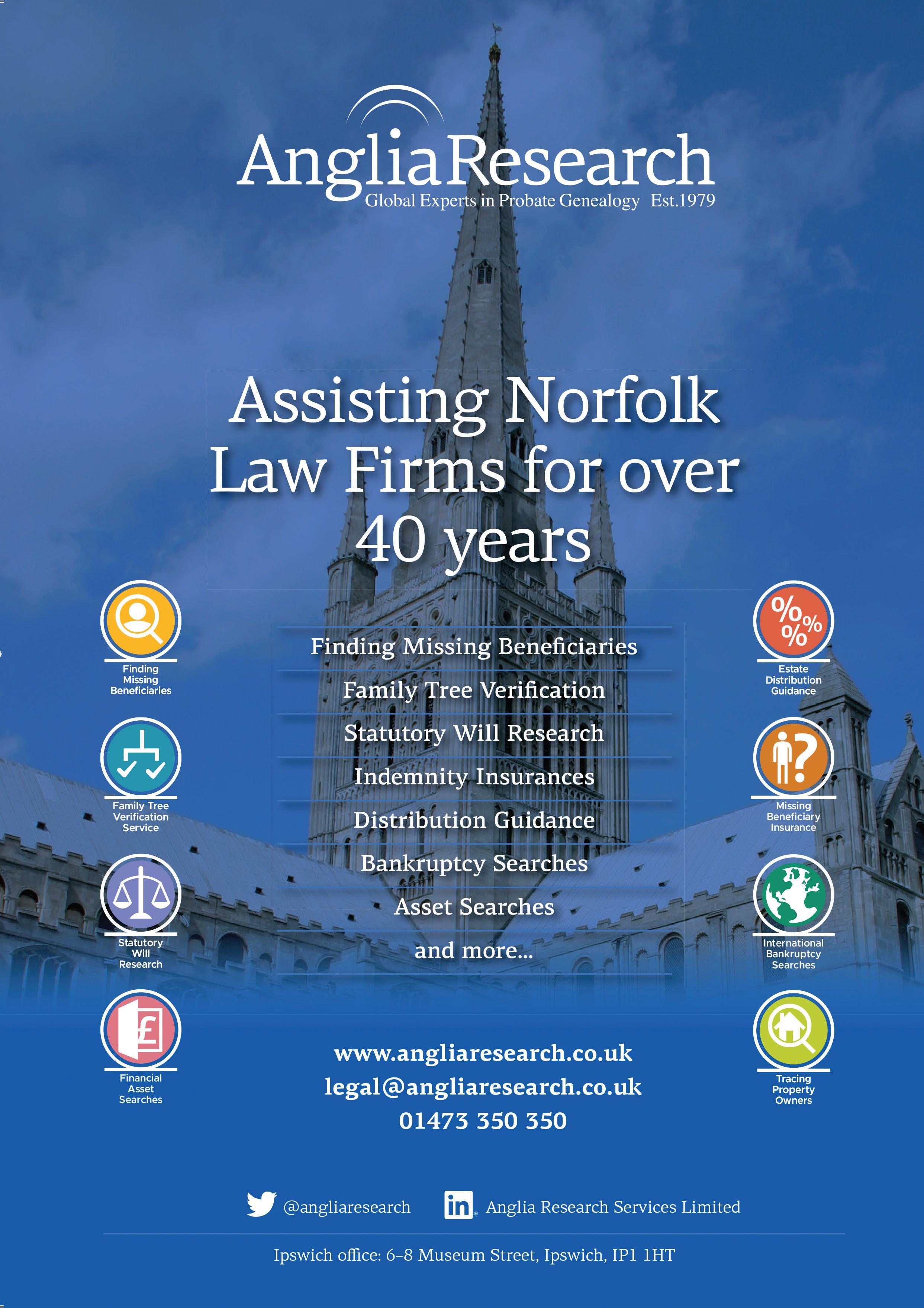
Relationships remain key in the age of technology

Personal relationships are still the heartbeat of business success, despite the increasing use of technology. Personal relationships convey how we value one another. Personal relationships enable us to have empathy with one another’s situations.
In his seminal book, “How to win friends and influence people,” Dale Carnegie wrote
Don’t get me wrong, consolidation has brought with it huge advances in technology and customer experience. Gone are the days of endlessly calling suppliers to order reports, collating them manually, printing off reams of paper and hand delivering the search to the office…. and good riddance too! With the exception of local authority searches, most of the reports are now available same day, with many returned in minutes.
The delivery platforms are slicker, smarter, more intuitive and spot potential risks that might need to be accounted for, and errors in search requests. But some of this technological advancement has come at the expense of good, old-fashioned customer service. The personal touch.
supplier. When I asked what it was that brought them back to us they said that they felt as though they were a number, rather than a client. It was the personal touch that was missing from their communications; they didn’t feel as though they ever spoke to the same person twice. There wasn’t a familiar voice at the end of phone when things went wrong (as things inevitably do in conveyancing!).
Business relationships then are as much about understanding the challenges we all face in our daily encounters.
The search industry has seen significant changes in recent years. Massive consolidation has seen so many of the traditional search companies swallowed up into larger corporates. We have to find ways of differentiating our service offerings, building that trust in client relationships, and delivering services which conveyancers feel add value to their business.

Do we rely on technology too much? Are chat bots, apps and portals what our clients really want and need? What happens when things go wrong? People need reassurance, they need to be able to pick up the phone, or send an email, and feel as though somebody is taking a personal interest in resolving their issue rather than “chat” to a faceless bot or send messages via portals.
I recently won back a client from a rival
In our experience 90% of orders go through with little to no intervention required. But that 10% is where relationships are made and broken. This is where knowledge, experience, and expertise really make a difference. Recognising that the conveyancer is almost certainly under pressure, whether it be from the client, agent or the other side, and being able to take that weight off and deal with the issue through to completion is a critical part of the business relationship.
Whether it’s a query on a report back which requires clarification, or chasing up an expedited service. It’s about trusting that the job is going to get done right, first time.
Winning friends and influencing people is all about understanding their situation and being empathetic to their challenges while excelling at service delivery
www.nnls.org 30 - Norfolk Law - Advertorial
“If there is any one secret of success, it lies in the ability to get the other person’s point of view and see things from that person’s angle as well as from your own.”

Young adults and consent to a DNA test
Across the world, the ability of children or indeed young adults to make decisions about issues concerning themselves is full of dilemma. Under UK law, the line between childhood and adult hood is 18 years of age1; the age of majority. This means for example, that an individual can of their own volition, vote, enter contracts (credit cards, take out loans) buy tobacco or get a tattoo. The law then allows for capacities at each age from 10 through 17, though in this article with regard to DNA testing, we will single out age 16, as now armed with a National Insurance number, minors may join the Army, get married, drink alcohol in a restaurant, get a full time job and have sexual intercourse. This is perhaps appropriate for most in todays’ UK society.
When it comes to medical treatment, then the law is very clear that the age of consent to a procedure is 18 and after this age, individuals have as many rights as adults. Under some circumstances, 16 year old individuals can make medical decisions without consent of their parents and at younger ages than that, the degree of independent consent is reliant on their competence to understand the procedure – age alone is a not a sufficient criterion. Specifically, the test of these criteria is the Gillick test2 which relates to a child under 16 receiving contraceptive advice without her mother’s consent. Over time this has been used by the medical fraternity to gain consent from under 16s, provided they can demonstrate understanding of the nature and implications of the proposed treatment. A subset of this principle is the Fraser guidelines which specifically relate to
welfare advice for under 16’s. When considering a DNA test to determine a biological relationship (such as a paternity test), then it is important to remember that a human identity or paternity test is not a medical matter; it is quite different to other types of genetic test which are used for example, for disease diagnosis. The relevant legislation is the Human Tissue Act 1984 and Human Tissue (Scotland) Act 20063, which as an aside to its intention to clamp down on the unauthorised use of human tissue as revealed in the Bristol Royal Infirmary enquiry4, has captured the need for consent for the analysis of samples for a DNA test and which are intended for human identity testing. The Department of Health has produced helpful guidance5 and a good practice guide for companies like our own.
In addition, the Ministry of Justice operates an accreditation system for bodies “that may carry out parentage tests directed by the civil courts in England and Wales under section 20 of the Family Law Reform Act 1969” This list is reconsidered every year and requires DNA testing companies to hold the key accreditation for calibration and testing laboratories, ISO/IEC 17025. We are pleased to say that we have been on “the list” for more than 14 years.

With regard to consent, then the first principle derives from the established laws of consent and the second from the Human Tissue Act 2004, where consent is required for possession of material from a human body that contains human cells (a buccal sample) with the intention of analysing the DNA. We must be satisfied that whoever is providing the consent for a DNA test is authorised to do so. We for example, take steps to ascertain the basis for parental responsibility and as the DNA testing organisation providing the test, are satisfied that those consenting to the taking of a sample from the child, are authorised to do so. It is also important that the consent is given on the understanding that the nature and possible consequences of the test are understood.
Parental Responsibility refers to "all the rights, duties, powers, responsibilities and authority which by law a parent of a child has in relation to the child and his property" 6. In real terms, this means having input into substantial matters affecting a child’s well-being, such as education, religion medical treatments and appointing a guardian as well as having input with regards to holidays and extended stays outside the family home. Importantly, this also relates to legal proceedings involving the child and the registering/ changing of a child’s name on a birth certificate. De facto , this applies to the non-medical matter of human identity testing using DNA technology, commonly known as for example, a paternity, sibling or indeed a grandparentage test.
So who has Parental Responsibility for a child? Well firstly, the mother always (and automatically) has Parental Responsibility. Intuitively, we might think this named individual would necessarily be the biological mother (the individual who gave birth to the child) and this is generally the case. Exceptions occur in the case of surrogacy where the surrogate mother will have Parental Responsibility until it is relinquished with a Parental Order. Interestingly, if a surrogate mother is married, their partner will also have Parental Responsibility for the child.
There are various additional ways that a father can gain Parental Responsibility over a child, these are: a) entering marriage or civil partnership with the mother, b) obtaining a Parental Responsibility order from a court, c) using a Child Arrangement Order, being named as a resident parent, d) having a Residence Order in place (prior to 22nd April 2014) and e) entering a Parental Responsibility Agreement with the mother. If there has been a marriage/civil partnership and then a divorce/dissolution, then the Parental Responsibility rights are retained.
Automatic Parental Responsibility is not conferred on unmarried biological fathers, unmarried partners (male or
Canine www.nnls.org
Poppy’s
32 - Norfolk Law - Advertorial
When Poppy’s Dog Guardian conta
Dr Neil Sullivan
female), grandparents, other biological relatives or a step-father/step-mother. Unmarried/non civil partnership fathers who (re-) register their names on a birth certificate after 1st December 2003 can gain Parental Responsibility.
We always ask for the mother’s consent to a DNA test if the child is under 16 and encourage her to participate in the test by giving a DNA sample. Our most common question is: “Why do you need that? I know I am the mum.” Well, we are each made up of half of the mothers DNA and half of the fathers – though until we test it, we don’t know which half ! By determining which portion comes from the mum, we can then be sure which DNA relates to the father and this greatly improves the statistics of an inclusion, i.e. that the man is in fact the biological father of the child.
If you have a case requiring a DNA test to establish parentage or would just like some advice on how to establish a human relationship using DNA, then please contact us, we would be please to help.
Please see: http://www.dadcheckgold. com.
Tel: 0191 543 6334
e-mail: sales@dadcheckgold.com

About the author:
Dr Neil Sullivan , BSc, MBA (DIC), LLM, PhD is General Manager of Complement Genomics Ltd (trading as Dadcheck®gold).
Complement Genomics Ltd (trading as Dadcheck®) is accredited by the Ministry of Justice as a body that may carry out parentage tests directed by the civil courts in England and Wales under section 20 of the Family Law Reform Act 1969.
Citations
1 Family Law Reform Act 1969
2 Gillick vs West Norfolk and Wisbech AHA and DHSS [1985] 3 WLR (HL)
3 https://www.legislation.gov.uk/ ukpga/2004/30/contents; https:// www. legislation.gov.uk/asp/2006/4/contents
4 http://www.bristol-inquiry.org.uk/ interim_report/toc.htm
5 https://www.Wales.nhs.uk/ documents/DH_082624.pdf
6 The Children Act 1989, s3(1)
www.nnls.org Norfolk Law - Advertorial - 33 The
YouGov poll: Legal firms are failing to support employees with mental health and wellbeing
Many legal firms are failing to support the mental health and wellbeing of their employees, a survey of companies and staff has revealed.
Despite a strong demand for help with the cost-of-living crisis and stress and anxiety, employers saw supporting staff morale as low on their list of priorities, according to the YouGov poll.
Where support was offered, in the form of wellbeing advice and counselling, take-up was low, suggesting it did not always meet the needs of staff, the findings reveal.
The online poll of 3000 British employers and employees – commissioned by welltech company Frog Systems and conducted last December – showed that 59% of legal firm staff required support for stress and anxiety, while 44% said they needed help to get through the cost-ofliving crisis.
In addition, 51% said they would benefit from support from their employer to help cope with grief and loss.
However, only 37% of the legal firms surveyed said they regarded improving staff morale or encouraging healthier lifestyles as their responsibility, according to the poll. They listed attracting and retaining talent and improving productivity as their main priorities.
The survey also highlighted that, while outlay on support for staff mental health and wellness was higher than in other sectors, only 23% of employers in the legal and professional services sectors more generally spent nothing at all, and 35% spent £100 or less, per-employeeper-year.
When asked who they would go to for help, only 2% of legal staff said they felt confident about going to their boss or a work colleague if they had a problem in their personal life or with their finances. More people said they would search the Internet before going to their line manager with an issue.
Those working with law firms and their staff to address employee wellbeing said the findings demonstrated an urgent need to address a growing problem.
Elizabeth Rimmer, CEO of LawCare – a mental wellbeing charity for the legal profession – said: “Despite the range of wellbeing supports on offer in law firms, it is telling that in this poll only 2% of legal professionals would feel confident in talking about their wellbeing with colleagues.
“EAP programmes, educational seminars, mindfulness, and gym sessions don’t create a working environment that is psychologically safe, where people feel valued and able to talk with colleagues about concerns. It is time to widen the approach to wellbeing from a focus on individuals to looking at how organisations foster a culture that supports the mental wellbeing of their people, and this responsibility lies in the boardroom.”
Henrietta Jowitt, an advisor to the Mind Forward Alliance and a former CBI deputy director general, said: “Most leaders are focussed on attracting and retaining talent and improving productivity, and yet a third of them spend nothing on employee wellbeing. They need to make this connection.


“Wellbeing is an output – it is the result of a whole range of inputs that support your people. It is not a package, off the shelf. If you don’t understand your colleagues’ needs and look after their wellbeing, so that they feel they are safe, belong and are supported in a way that works for them, they will neither stay nor produce their best work.”
Psychologist Peter Abrahamsen, who works with stressed lawyers, said: “My typical lawyer client is at crisis point from excessive and sustained pressure at work directly affecting their mental and physical health. They are
disillusioned by their profession and struggle with the effects on their home life which is often falling apart.”
Compared with staff in some other sectors, those working in the legal sector and professional services appeared to receive similar benefits focused on traditional offerings such as Employee Assistance Programmes, life insurance, private medical care and perks and discounts, however only around one in four used them if at all.
Phil Worms, CEO of Frog Systems, said the report showed a gulf in trust in the workplace around wellbeing support for employees.
“Whilst many employers seem to understand the emotional and physical challenges being faced by their employees, they don’t appear to be able to provide the right wellbeing tools and information to support them.
“Solutions which are reactive, standalone, ‘tick box,’ not trusted, or do not provide sufficient insight will not enable the deployment of early intervention and support strategies.
“By listening to, and understanding what employees need, companies can start to build stronger, more empathetic, and productive work environments. Access to wellbeing support should not be a lottery or a privilege.”
Notes:
• Frog Systems is a welltech company that was founded in 2015.
• The Company provides first line support to employees through its Ashia digital platform.
• Frog Systems is the first wellbeing provider in the UK to have achieved the internationally recognised We Invest in Wellbeing Gold accreditation from Investors in People.
• Frog Systems has raised over £2.1M in private equity funds to date.

www.nnls.org 34 - Norfolk Law - Advertorial
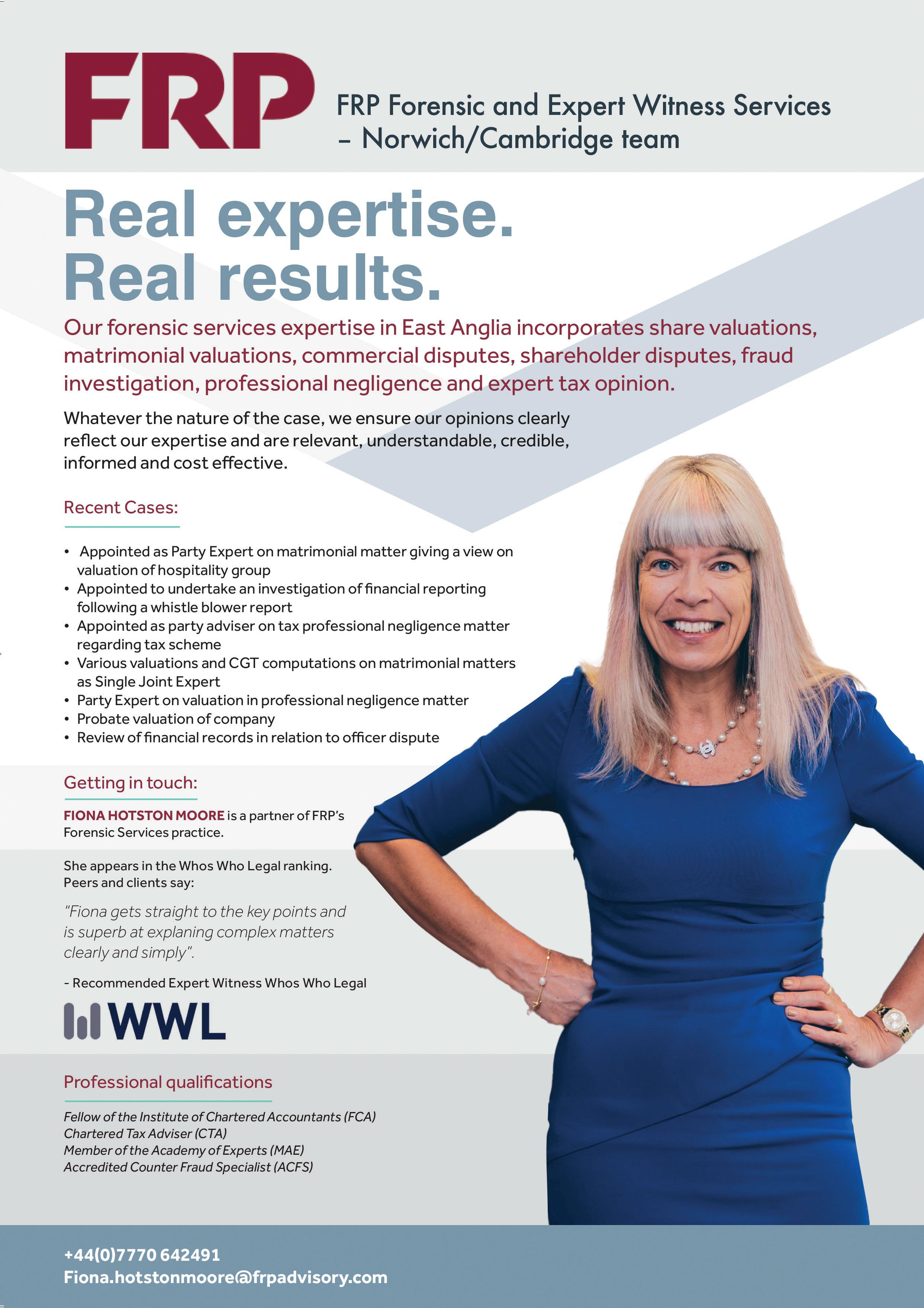
























 - Allan Freeman, Chair of Remember A Charity
- Allan Freeman, Chair of Remember A Charity































